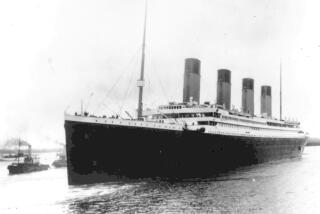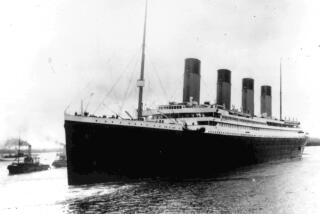A Night Long Remembered
- Share via
In the maelstrom of history, most events flow by unremarked, some get a moment or two in the spotlight, and a few grip the public consciousness and are seared into peoples’ minds in a way that changes thought. The sinking of the Titanic on April 15, 1912, a ship whose very name mocked the dangers of the sea, was one such event. There have been many shipwrecks in history, and many other disasters--including those with greater loss of life. But few have the staying power of the Titanic. The image of that crippled ship, its stern in the air, slipping silently into the ocean while the orchestra played on deck, is truly “a night to remember.”
Now it has been found in 13,000 feet of water in the North Atlantic, and public interest is once again rekindled. More than 1,500 passengers and crew members went down with it--including several prominent millionaires--along with substantial treasure. There is talk of attempting to raise the ship, but it is being dismissed as foolhardy and a desecration of the graves.
What accounts for the Titanic’s special place in the recent history of the sea? In its day it was the world’s largest ship. It was pronounced unsinkable, but sank on its maiden voyage. There were not enough lifeboats, and the crew was inadequately trained in how to use them. Its SOS over the new medium of radio went unheard by a ship nearby, but was picked up by an amateur radio operator in New Jersey, David Sarnoff, who became a broadcasting pioneer.
The Titanic was the forerunner of a theme that has echoed throughout this century: over-confidence in technology. Science has accomplished wonderful things that have changed our lives. We are lucky to enjoy its benefits. But, despite the best efforts of humanity’s brains and skills, nature still has the upper hand.
More to Read
Sign up for Essential California
The most important California stories and recommendations in your inbox every morning.
You may occasionally receive promotional content from the Los Angeles Times.













